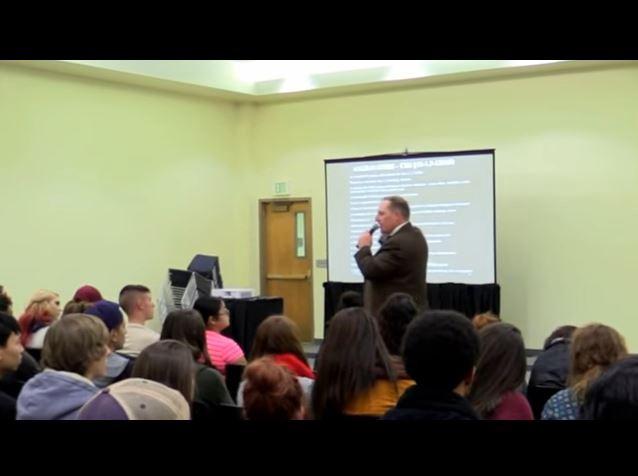Colorado death penalty case challenged after prosecutor bragged about his involvement
“I was your worst nightmare.”

“This is my resume,” Jack Roth, a former assistant attorney for the Colorado Attorney General’s Office, told a group of students from the University of Colorado last November. A brief pause, as dramatic music fills the room. “I was a cop while I was a lawyer, which means that I was your worst nightmare. I was a lawyer with a gun and a Taser.” So began Roth’s lecture on the state’s death penalty.
Video of Roth’s speech — made while he was still working for the state attorney general — surfaced early this summer. In it, he explains that prosecuting capital cases and going up against defense attorneys “seems like a game.” He also brags about seeking capital punishment for a man who fatally stabbed a corrections officer — even though the victim’s family is adamantly opposed to the death penalty. Now, defense attorneys for the defendant in question, Miguel Contreras-Perez, are using the footage to challenge the legality of pursuing the death penalty. According to the Colorado Independent, lawyers for Contreras-Perez filed two motions on July 31, arguing that Roth revealed details of a sealed case and did not have authority to pursue the harsh sentence in the first place.
By the time he spoke to the students, facts of the case were part of the public record. In 2012, Contreras-Perez was housed at the Arkansas Valley Correctional for kidnapping and raping a teenager. He was sentenced to a minimum of 35 years. While serving his time, he used a kitchen knife to kill correctional Sgt. Mary Ricard and then attempted to kill another. Roth not only rehashed this information to the college students in November, but went on to explain his reasoning for seeking the death penalty.
“What if I told you in my Perez case, Mary Ricard’s family does not want the death penalty? They are very, very religious and they believe that killing is only in God’s hands,” he said. “They don’t want the death penalty. But I’m still going forward with it. Why? Well, I can tell you my reason is that I’m looking out for every other corrections officer out there. He’s already serving 35 to life. If I don’t go death penalty on him, what’s that say to every other corrections officer out there?”
Defense lawyer David Lane told the Colorado Independent that the speech could impede Contreras-Perez’ right to a free trial. In addition to filing a motion critiquing Roth’s brazen remarks, Lane’s team filed a motion to throw out the death penalty option in the defendant’s case. Crowley County District Attorney Jim Bullock — not Roth — should be the only person deciding what punishment to pursue. “The attorney general has no authority to prosecute a case simultaneously with, or instead of, the district attorney,” the motion argues. It claims the attorney general’s office is involved in the case because the Colorado Department of Corrections gave the agency nearly $1 million to take it on.
The news organization reports that Roth left the attorney general’s office within a week of the court filings. A decision regarding potential punishments for Contreras-Perez’ has yet to be made.
The legal drama is unfolding as many Coloradans appear hesitant to execute people for their crimes. In 2015, two prominent cases in which defendants were eligible for the death penalty, including that of Aurora movie theater shooter James Holmes, concluded with life sentences instead. Today, the state has one of the smallest death row populations in the country, with three people — all of whom are black men from the 18th Judicial District — waiting to die. In May 2013, Gov. John Hickenlooper issued an executive order that granted one of the men, Nathan Dunlap, an indefinite reprieve.
“If the State of Colorado is going to undertake the responsibility of executing a human being, the system must operate flawlessly. Colorado’s system for capital punishment is not flawless,” the order stated. The governor pointed to the “inequitable” and “arbitrary nature” of death penalty sentencing and the fact that it doesn’t make communities safer. He emphasized those same ideas in a 2015 op-ed, adding that race and location have determined who gets to live and who gets to die at the hands of the state.
But the Contreras-Perez case shows how fiercely committed many elected prosecutors still are to sentencing people to death. State Attorney General Cynthia Coffman wants the option left on the table unless voters repeal it. Roth belonged to a special prosecution unit dedicated to helping local district attorneys prosecute cases, including “death penalty-eligible homicides,” and to fighting death penalty appeals. The current district attorney for the 18th Judicial District, George Brauchler, did not prosecute the three people sitting on death row there, but he is a staunch supporter of capital punishment and running for governor. If elected, he is sure to take death penalty fervor with him to the state capitol. He has said he will jump start Dunlap’s execution “Day 1.”
Besides squaring up against local and federal prosecutors, opponents of the death penalty are facing an uphill battle. The state legislature has tried and failed to abolish it three times since 2009, including one attempt this year. With Republicans in control of the state senate, the punishment isn’t likely to be banned soon. As Colorado death penalty scholar Michael Radelet toldWestword earlier this year, “[t]here are some things it does real well; it allows politicians to create the false impression that they’re actually doing something about crime. It allows them to look tough.”
As the defense team for Contreras-Perez awaits a decision, it is clear that their defendant’s case doesn’t exist in a vacuum. Roth may have been dismissed from the case and attorney general’s office, but set against the backdrop of state politics, the prisoner’s fate could set the tone for future prosecution.
